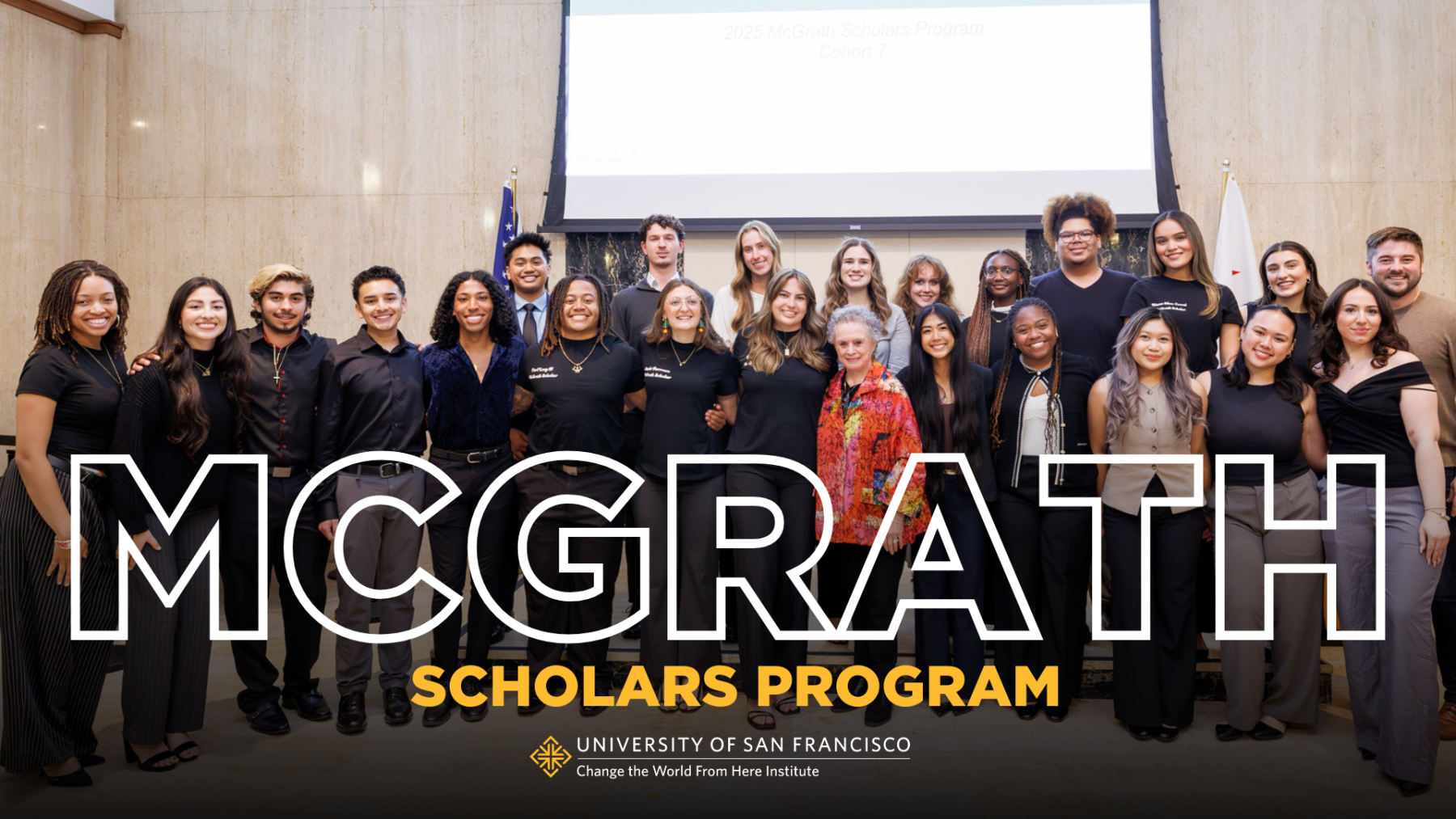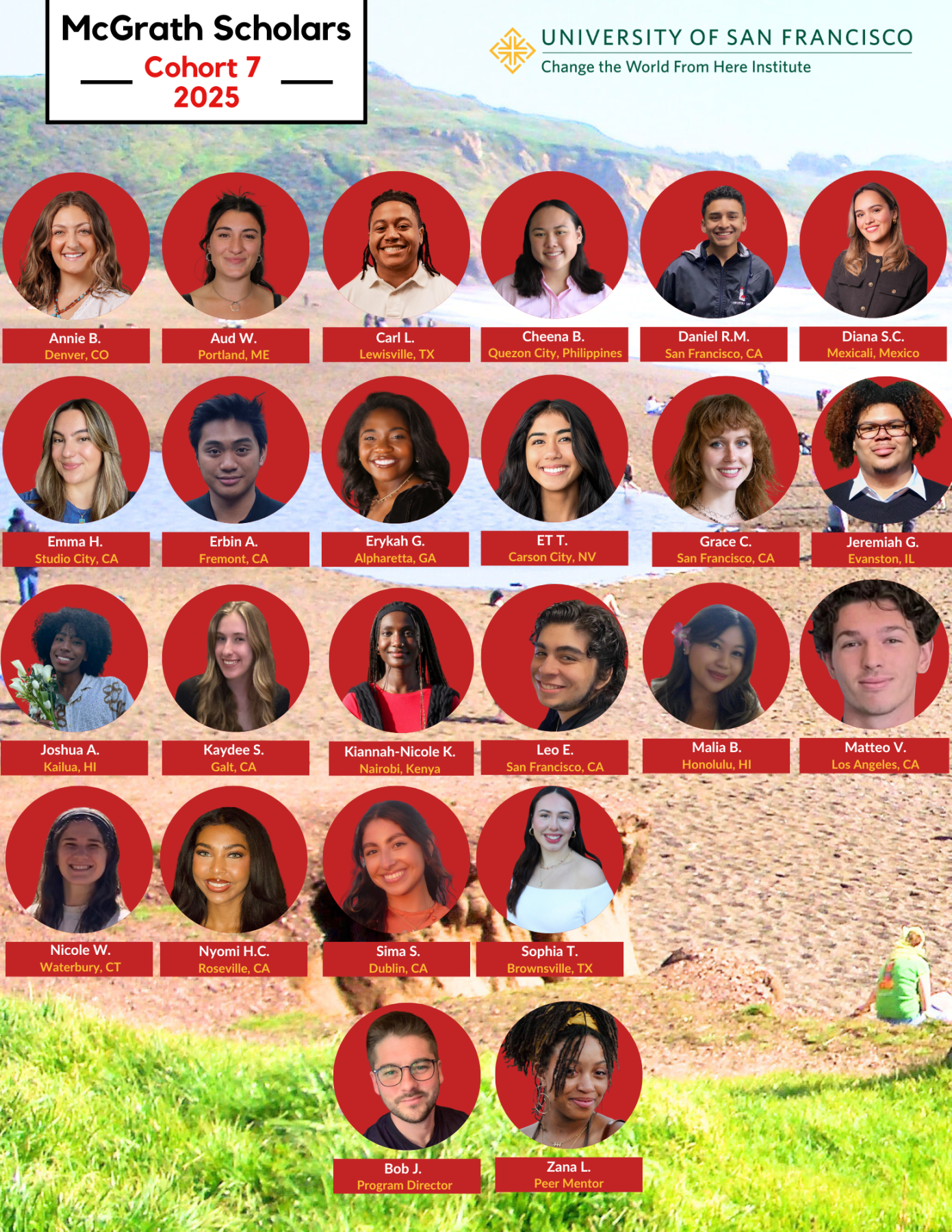McGrath Scholars Program

Our Mission
The McGrath Scholars Program of the Change the World From Here Institute was created to develop critically aware and goal-oriented system thinkers who are motivated to change their communities for the common good.
The program will facilitate and nurture leaders who practice cooperative, collaborative and inclusive leadership; engage in both courageous and compassionate action; cultivate changes in values by re-framing and reinterpreting situations, and practice contemplative self-reflection.
Benefits
The McGrath Scholars Program is an opportunity for students to enroll in a unique, 2-credit leadership course and join an exceptional cohort of peers, further enhance their skills, and engage in an experiential project.
- Resume builder as a McGrath Scholar
- Accelerated short-term class, Monday evenings: January through April.
- Retreat opportunity, two days off-campus in the Marin Headlands
- Enhanced learning through peer-to-peer interactions and networking
- Special recognition as a McGrath Scholar at graduation
- Invited to an annual McGrath Scholar alumni network event
Curriculum
The McGrath Scholars complete a two-credit leadership course (USF 300) that approaches leadership through the holistic development of the student via academic lessons, skills and engagement taught through a leadership retreat, and leadership mentoring through peer support.
- Self-transformation
- Vision and Systems
- Courageous Action
- Change and Collaboration
Experiential Learning Outcomes
- Identify and model personal values of integrity and ethical leadership, and engage with those ideas in larger scales and contexts
- Demonstrate key leadership and personal values through community relationship-building with courage and compassion
- Manage ambiguity and work in a self-directed way
- Incorporate creative thinking and innovation in daily leadership practice
- Demonstrate the ability to problem solve and recommend solutions for systems, problems, and issues that challenge the common good
McGrath Scholar Eligibility
USF Juniors and Seniors from all schools and colleges are welcome and encouraged to apply. We consider Juniors and Seniors to be those who expect to graduate within 1 year from their participation in the program. For example, if you intend to graduate Spring 2027, you can begin applying either Fall 2025 for Spring 2026 or Fall 2026 for Spring 2027.
All registered Juniors and Seniors enrolled in Spring 2026 will apply in Fall semester 2025. Acceptance into the program will require an essay-based application and an interview with the course faculty or a member of the McGrath Scholars Interview Team.
The cohort of McGrath Scholars will be limited to 24 undergraduate students. To be selected, you must apply and be considered.
Have a question about the program? Email us at: changeinstitute@usfca.edu
Cohort 8 (Spring 2026) Recruitment PROCESS
The recruitment process for Cohort 8 of the McGrath Scholars Program begins in the Fall semester. The recruitment process begins with nominations, followed by written applications. Applications are the first round of our selection process, followed by an interview. Not all applicants will be offered an interview. Once interviews have been completed, the Selection Team will convene to determine the next cohort of McGrath Scholars. Below is the recruitment timeline:
- Applications Open: Tuesday, September 9
- Applications Due: Tuesday, October 7, by 11:59 p.m.
- Optional Letters of Recommendation Due: Wednesday, October 8, by 5 p.m.
- Email letters to: changeinstitute@usfca.edu
- Virtual Interview Offers: Friday, October 17 by 5 p.m.
- Virtual Interview Period: Monday, October 27–Thursday, October 30
- Program Offers: Friday, November 14 by 5 p.m.
Application Process
To be considered for the McGrath Scholars Program, all applicants must complete the online application, which includes:
- Resume Upload
- 5 Essay Response Questions
- Strongly Encouraged: Staff/Faculty Letter of Recommendation
We strongly encourage letters of recommendation from staff/faculty who can speak to your academic and/or leadership performance. USF and non-USF affiliates can write letters that best speak to these qualities.
If you would like to include a letter of recommendation, have your letter writer email it to us directly at changeinstitute@usfca.edu
Cohort 7 (Spring 2025) McGrath Scholars

2025 CAPSTONE PROJECTS
Each cohort of McGrath Scholars is broken down into smaller teams that work together through the semester to develop a capstone project. Each project must produce a plan for a tangible outcome that benefits the common good in our city, country, or worldwide community. Scholars are encouraged to be innovative in their project development by designing new technologies, products, or services unseen in societies.
Take a look at the capstone project focuses from our 2024 McGrath Scholars as well as copies of their slide shows from our annual Capstone Project Presentations.
Members: Bailey Steadman, Will Hawkins, Memar Ivy, Isabella Williams
Our project began while we were volunteering at City Hope when we noticed
that one guest was not getting the resources they needed due to the inability of non-profits to communicate and share resources. After weeks of research, experience with members of the unhoused community, and many iterations of our prototype we concluded that resources needed to be centralized. To facilitate this, we focused on building community and reciprocity between non-profits, because when relationships are built, it becomes easier to share ideas and resources.
Our prototype not only gets nonprofits talking to each other, but also provides an organized place for the unhoused to find the services they so desperately need.
Members: Felicia Mitchell, Cyrus Ahanin, Carson Okano, Jash Mehta
This project was completed with design thinking in mind as we developed our own experiences, combining them with the personal accounts of those around us. Using the process of storyboarding, POV and EQ trainings, and How Might We frameworks, we aimed to help nonprofits provide safety, dignity, and care to the unhoused in San Francisco. With all this in mind, we came together as a group to ideate, conduct secondary research, and collect the feedback of those around us to land on a direction that accomplishes our goal while keeping the values of our mission. Finally, we created a pitch representing this process and detailing our prototype to share with our stakeholders, partners, and peers.
Members: Zana Lawrence, Evan Cajigas, Naomi Villaruz
Our app, “It’s Giving Time” serves as a bridge between nonprofits and college students, aiming to increase volunteer engagement and awareness. Through the app, students can easily explore a wide range of volunteer opportunities based on their interests, availability, and skills. The platform provides a safe space for students to connect with nonprofit organizations, organize their volunteer shifts, and increase their community engagement. Ultimately, our app enables college students to create a meaningful impact in their communities while also promoting personal growth. Likewise, nonprofit organizations will benefit from the heightened volunteer engagement facilitated by our platform.
Members: Evan Harper, Jewel Jurisprudencia,Maya Visconte
We created Community cookbook that has two main components: the connection center and the collaborative cookbook. The connection center holds the interactive map, the ‘finding connection’ page, and the chat feature. The cookbook offers the space for nonprofits to feed the community to share culturally significant recipes, aiming to diversify the meals being shared to honor the cultures of
their visitors.
Members: Alfa Belen, Jared Murti, Samantha Martinex, Alexis Hall
Our project aims to create diverse and innovative solutions that produce sustainable outcomes and empower the unhoused individuals in San Francisco. Our project will promote collaboration between us, the Pack Rats, and nonprofit organizations while hoping to decrease the stigma of working with the unhoused population. We want to increase public awareness about nonprofit organizations that serve the unhouse and address the challenge and issue of volunteer retention.
Members: Amel Murray, Kemelyn Alvarado, and Magdalena Macias
After partnering with Larkin St. and understanding the need to identify unhoused youth in SF so that they may be aware of the resources available to them, we knew a broad campaign on the Invisible Narrative would be beneficial. Our design can be used on different varying forms of media and advertising platforms. The Invisible Narrative campaign material includes questions asking the observer, “Does your home...Change every night? Depend on someone else? Feel unsafe?” which are followed by statistics on the unhoused youth population increasing awareness of the high rate of unhoused youth.
More importantly, the campaign material lists Larkin Street Youth Services information, ensuring that anyone engaging with our content is informed about the services given by youth organizations such as Larkin. We knew it was important to also educate the general public on resources available to young people who are unhoused or who are at risk of facing homelessness to minimize the effects of the Invisibility Narrative.